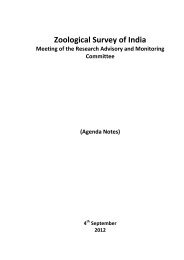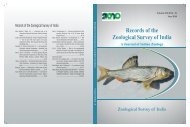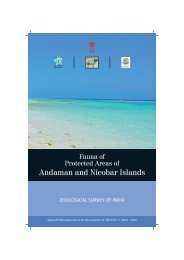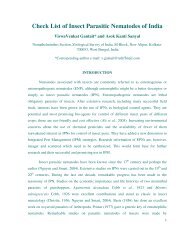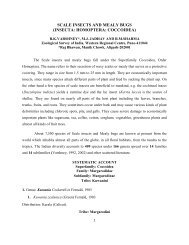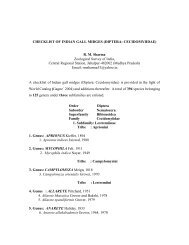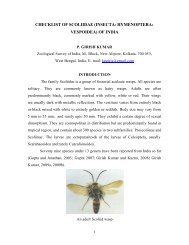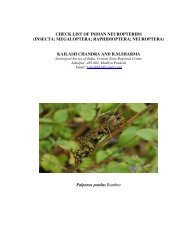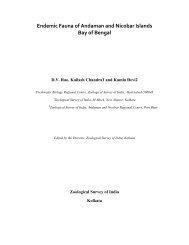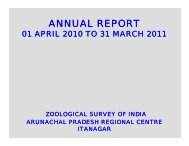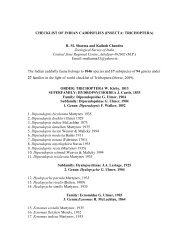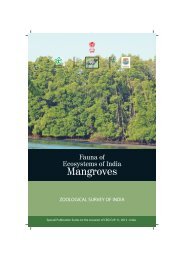Vol. 111 - Part I - Zoological Survey of India
Vol. 111 - Part I - Zoological Survey of India
Vol. 111 - Part I - Zoological Survey of India
You also want an ePaper? Increase the reach of your titles
YUMPU automatically turns print PDFs into web optimized ePapers that Google loves.
8 Rec. zool. Surv. <strong>India</strong><br />
POLITICS, LAMARCKISM AND MICHURINISM<br />
French Marxists accepted Lamarckism since it<br />
contradicted creationists. Russian Marxists accepted<br />
Lamarckism in the name <strong>of</strong> much debated Michurinism<br />
(Darlington, 1953). Michurinists, the neo-Lamarckian<br />
plant breeders believe, “By selecting the conditions<br />
which force a plant to abandon the fixed trend <strong>of</strong> its<br />
adaptability and thus destabilizing abolishing the<br />
conservatism <strong>of</strong> its heredity (either by sharply changing<br />
the conditions <strong>of</strong> cultivation or by enforced fertilization,<br />
especially in the distant crosses) it is possible in<br />
subsequent generations, by a proper choice <strong>of</strong> the<br />
conditions <strong>of</strong> training rapidly to create new requirements<br />
<strong>of</strong> the plant, to create new breeds and varieties differing<br />
radically from the initial ones” (Lysenko, 1951).<br />
LAMARCK’S VIEWS AND MODERN<br />
PHILOSOPHY OF BIOLOGY<br />
Lamarck’s hypothesis was practically deductive. He<br />
did not cite any evidence <strong>of</strong> his contentions. His<br />
philosophy was based on seventeenth-eighteenth<br />
century tradition although he contradicted creationists,<br />
and essentialists and developed uniformitarianism and<br />
evolutionism. His uniformitarianism rejected the dogma<br />
<strong>of</strong> recency <strong>of</strong> earth (about 6000 years, as it was believed<br />
by most <strong>of</strong> the earlier philosophers) and hypothesized<br />
an extremely high age. This, in fact, led to the idea <strong>of</strong><br />
the formation <strong>of</strong> present land scape as a result <strong>of</strong><br />
gradual and slow process. Mayr (1976) conjectures that<br />
this might have influenced Lyell’s idea <strong>of</strong><br />
uniformitarianism and finally Darwin. Lamarck’s<br />
‘inherent progression’, ‘sentiment interieur’ etc. appear<br />
as vitalistic approach to biological principle like that <strong>of</strong><br />
ancient Greek philosophers. But vitalism as a biological<br />
force is now being debated. Moreover, he was deist<br />
and used the word creation which is very much against<br />
the word evolution.<br />
CAUSES OF LAMARCK’S DEFAMATION<br />
Lamarck’s researchers on geology, meteorology,<br />
physiology and many other disciplines were proved<br />
wrong even during his life time (Simpson, 1964). Most<br />
important factor for his defamation was his poor literary<br />
style. Hence readings <strong>of</strong> his works were boring. His<br />
Philosophie Zoologique contains several repetitions<br />
and confusing statements. Unlike Darwin’s Origin <strong>of</strong><br />
Species, Lamarck’s book was not written with inductive<br />
principles and evidences. To know his views one has<br />
to read every page and line has to carry out serious<br />
research and find out what he meant.<br />
Lamarck left no note book and founded no school,<br />
who could explain his views to his contemporaries.<br />
Mayr (1976) commented.” ......If Lamarck had the<br />
personality to found a school, his theories might have<br />
become the starting point <strong>of</strong> an improved evolutionary<br />
interpretation.”<br />
Cuvier’s personality and oratory made both Ge<strong>of</strong>froy<br />
St. Hillaire dumb and French people could not hear<br />
anything about evolution for about a centuary.<br />
According to Simpson (1953) after the publication <strong>of</strong><br />
Darwin’s theory on Origin <strong>of</strong> Species critics <strong>of</strong> the<br />
theory <strong>of</strong> natural selection developed a modified version<br />
<strong>of</strong> Lamarck’s views now known as neo-Lamarckism.<br />
Simpson (1953) said that the neo-Lamarckians<br />
contended that materials for evolution were individual<br />
modifications caused by reactions <strong>of</strong> organisms (a<br />
point really Lamarckian) and by action <strong>of</strong> the<br />
environment on organisms (a point flatly denied by<br />
Lamarck). The neo-Lamarckians “insisted that such<br />
modifications were heritable, otherwise they could have<br />
no direct influence on evolution (Lamarck believed this,<br />
but so did Darwin and most other students from<br />
antiquity to about 1900). Simpson (1964) commented,<br />
“This is an ironic joke : that the theory to which all<br />
Lamarck’s name became and still remains attached and<br />
to which all his posthumous fame is due fundamentally<br />
different from what he himself intended. It would have<br />
been bitterly repudiated by him and he might well have<br />
preferred the neglect that his lot while giving.”<br />
Elliot (1914) commented that ‘anyone <strong>of</strong> those<br />
quotes Lamarck have scarcely taken trouble to read his<br />
works.’<br />
SUMMARY<br />
1. Lamarck studied botany, zoology, geology,<br />
meteorology, physiology; most <strong>of</strong> them appeared<br />
nonsense in his lifetime. His studies on botany and<br />
zoology made him famous.<br />
2. He proposed evolution and contradicted the<br />
creationists, catastrophists and essentialists and<br />
speculated uniformitarianism. His views that all species<br />
including man evolved from other species was upheld<br />
by Darwin.<br />
3. Lamarck believed that all taxa have arisen by<br />
evolution and are a phylogenetic continuum.<br />
4. He believed that evolution took place from the<br />
simplest to most perfect forms, species concept was<br />
secondary in his philosophy while it was the corner<br />
stone for Darwin’s theory.<br />
5. Lamarck considered evolution is a slow and<br />
gradual process and the needs unlimited time.



